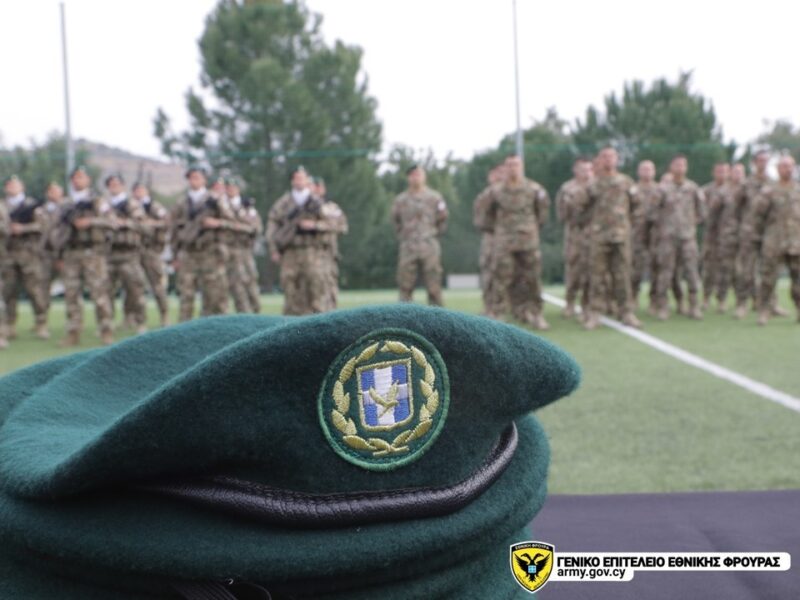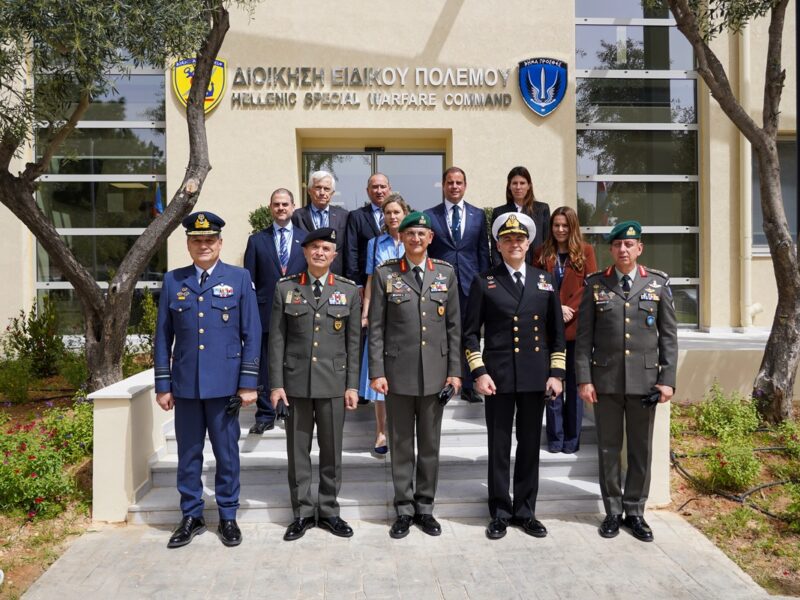The Minister of State for Foreign Affairs Nikolaos Hardalias announced the opening of the work of the Inter-Ministerial Meeting on “Transnational Crisis Management & International Armed Conflicts / Analysis – Effects of the Russian invasion of Ukraine”
The Deputy Minister of National Defense Mr. Nikolaos Hardaliasannounced today, Wednesday, November 23, 2022, the opening of the work of the 2nd High-Level Working Meeting on “Transnational Crisis Management & International Armed Conflicts / Analysis – Effects of the Russian invasion of Ukraine”, organized by the General Directorate of National Defense Policy & International Relations (GDPEADS) of the Ministry of National Defense and takes place from November 23 to 25, 2022, at the “Lieutenant (I) Nikolaos Sialmas” amphitheater, at the Ikaron School, in Tatoi.
In his speech, the Deputy Minister of National Defense stated the following:
“It is my honor and great pleasure to attend today the 2nd High-Level Working Meeting on “Transnational Crisis Management / Analysis – Impact of the Russian Invasion in Ukraine”, organized by the General Directorate of National Defense Policy and International Relations of the Ministry of National Defense .
An event that aims to analyze the ongoing crisis in Ukraine but also to trace, from the perspective of the holistic approach, the ways of dealing with and managing any escalation. And of course, the ultimate goal can only be the capitalization of the conclusions drawn so far from the war in Ukraine, since one crisis does not end until the next one begins.
Ladies and gentlemen,
although history is full of crises at all levels, in the international literature there is no consensus on its definition. But what we can easily assert is that all crises at their core contain a sense of urgency. Time constraints are a structural element of a crisis, any crisis. This call for immediate action gives crisis phenomena their dramatic character.
The subject by its nature is interdisciplinary and concerns the entire state apparatus. Empirical observation, in the course of history, has proven that the lack of coordination, as a result primarily of the absence of a unified plan, leads to piecemeal non-mutually supported movements and the main thing is that it drastically reduces the unity of action and, by extension, the effectiveness of the manner of crisis management.
It is therefore necessary to form a common framework of action, a common culture between the executives of the state apparatus as well as the development of synergies both at the inter-ministerial but above all at the “inter-agency” level.
From ancient times until today, the supreme task of every nation remains to ensure its “survival”, in a competitive international system. Ensuring “survival” is inextricably linked to the concept of resilience of its socio-economic and defense system. And I honestly can’t think of a more recent and more telling example to support my point than the mobilization of the Ukrainian people, and the resilience they’ve shown from the beginning of the conflict to this day. The concept of resilience and mobilization at the national level was translated into action by the trying Ukrainian people.
We have heard many times in our lives that a coin has two sides and this is true both literally and figuratively and I am truly glad to be given the opportunity, through this step, to state my opinion that indeed every crisis should be seen more as an opportunity rather than as a threat.
I could mention many examples. The Greek Government, bequeathing, for example, the experience gained from successfully dealing with the hybrid threat it faced in 2020, managed to turn the threat into an opportunity. The crisis acted as a springboard for a fruitful exchange of views and experiences and led to the development of a form of holistic approach, not in its narrow sense, but a form of holistic intergovernmental approach, covering all stages of a crisis cycle.
And believe me, I could talk for hours about many different crises and how these crises should be transformed into opportunities for the State, for the Homeland, through synergies, through general plans, through a unique , a different way of dealing with each crisis separately.
Ladies and Gentlemen, we live in an era where global and regional powers question and distance themselves from the existing international order of things, while at the same time developing hegemonic aspirations. For totalitarian regimes, as demonstrated by Russia’s recent unprovoked invasion of Ukraine, the phenomenon of war is at the core of their ideological-political code.
Within this fragile security environment, it should be clear, we should realize that crisis management is a dynamic but above all it is a continuous process. As we prepare for the next crisis, the previous one continues to be an object of study so that we can learn from, among other things, our mistakes, especially when they have high costs.
In closing, let me refer to Thucydides, who argued that in order to handle a crisis a leader must have foresight and foresight, speed in making and implementing a decision, training and skills in accessing and managing information . It is our absolute belief that these abilities remain more relevant than ever and as Aristotle argued, they are taught and cultivated and are in no way a divine gift or innate to man.
In this direction, we are working methodically, to provide the necessary knowledge background to the Armed Forces officers in the field of Crisis and Threat Management, and in this context I am convinced that the seminar in question can only have a positive impact.
With these thoughts, I would like to congratulate the General Directorate of National Defense Policy and International Relations of the Ministry and in particular my immovable, good friend Director General Kostas Balomones, but above all, his entire team and all those who work and assist in the excellent organization of this seminar.
I would also like to thank the distinguished speakers, recognized experts and specialists for contributing their knowledge and experiences.
With these few words, with my thanks for your effort and for the invitation, I declare the opening of your seminar today. Be well».
In the framework of the opening of the work of the Meeting, greetings were addressed by Vice-Chief GETHA Vice-Admiral Ioannis Drymousis PN as the representative of the Head of GHETHA and its General Director GDPEADS Dr. Konstantinos Balomenoswhile the introductory statement was made by the Ambassador of the Republic of Ukraine to Greece, Mr. Sergil Shutenko.
Present were the Chiefs of the GES Lieutenant General Charalambos Lalousis, General Vice Admiral Stylianos Petrakis PN and General Vice Admiral (I) Themistocles Bourolias, the Commanders of the 1st Army Lieutenant General Angelos Houdeloudis, the Special Warfare Command of the Special Warfare Command of the Special Warfare Command George Tsitsikostas and the Supreme Military & Islands Command of the Interior Dimitrios Houpis.
The Plenipotentiary Minister II, Mr. Alexander Papaioannou as a representative of the Minister of Foreign Affairs, the General Secretary of Public Order of the Ministry of Citizen Protection Lt. General e.a. Michael Karamalakis, high-ranking executives and officials of the wider public sector, distinguished members of the university community, as well as experts and specialists of recognized value from Greece and abroad.
First Appeared at: defence247.gr

